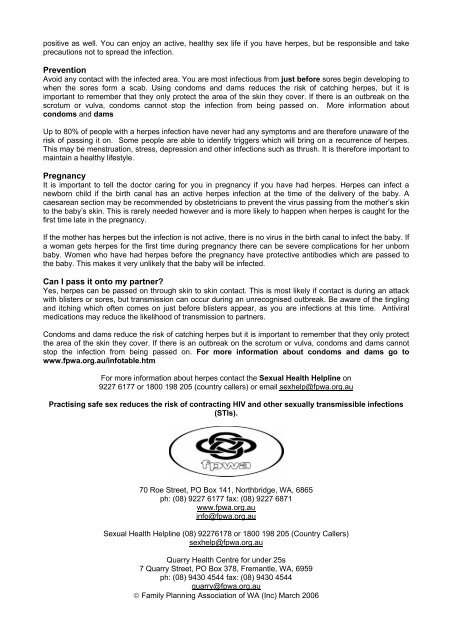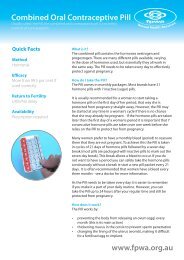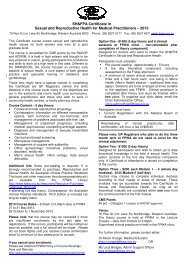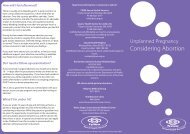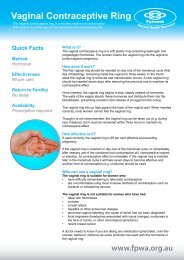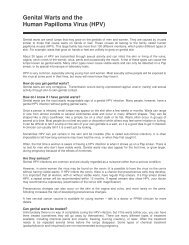Genital Herpes - FPWA Sexual Health Services
Genital Herpes - FPWA Sexual Health Services
Genital Herpes - FPWA Sexual Health Services
Create successful ePaper yourself
Turn your PDF publications into a flip-book with our unique Google optimized e-Paper software.
positive as well. You can enjoy an active, healthy sex life if you have herpes, but be responsible and take<br />
precautions not to spread the infection.<br />
Prevention<br />
Avoid any contact with the infected area. You are most infectious from just before sores begin developing to<br />
when the sores form a scab. Using condoms and dams reduces the risk of catching herpes, but it is<br />
important to remember that they only protect the area of the skin they cover. If there is an outbreak on the<br />
scrotum or vulva, condoms cannot stop the infection from being passed on. More information about<br />
condoms and dams<br />
Up to 80% of people with a herpes infection have never had any symptoms and are therefore unaware of the<br />
risk of passing it on. Some people are able to identify triggers which will bring on a recurrence of herpes.<br />
This may be menstruation, stress, depression and other infections such as thrush. It is therefore important to<br />
maintain a healthy lifestyle.<br />
Pregnancy<br />
It is important to tell the doctor caring for you in pregnancy if you have had herpes. <strong>Herpes</strong> can infect a<br />
newborn child if the birth canal has an active herpes infection at the time of the delivery of the baby. A<br />
caesarean section may be recommended by obstetricians to prevent the virus passing from the mother’s skin<br />
to the baby’s skin. This is rarely needed however and is more likely to happen when herpes is caught for the<br />
first time late in the pregnancy.<br />
If the mother has herpes but the infection is not active, there is no virus in the birth canal to infect the baby. If<br />
a woman gets herpes for the first time during pregnancy there can be severe complications for her unborn<br />
baby. Women who have had herpes before the pregnancy have protective antibodies which are passed to<br />
the baby. This makes it very unlikely that the baby will be infected.<br />
Can I pass it onto my partner<br />
Yes, herpes can be passed on through skin to skin contact. This is most likely if contact is during an attack<br />
with blisters or sores, but transmission can occur during an unrecognised outbreak. Be aware of the tingling<br />
and itching which often comes on just before blisters appear, as you are infections at this time. Antiviral<br />
medications may reduce the likelihood of transmission to partners.<br />
Condoms and dams reduce the risk of catching herpes but it is important to remember that they only protect<br />
the area of the skin they cover. If there is an outbreak on the scrotum or vulva, condoms and dams cannot<br />
stop the infection from being passed on. For more information about condoms and dams go to<br />
www.fpwa.org.au/infotable.htm<br />
For more information about herpes contact the <strong>Sexual</strong> <strong>Health</strong> Helpline on<br />
9227 6177 or 1800 198 205 (country callers) or email sexhelp@fpwa.org.au<br />
Practising safe sex reduces the risk of contracting HIV and other sexually transmissible infections<br />
(STIs).<br />
70 Roe Street, PO Box 141, Northbridge, WA, 6865<br />
ph: (08) 9227 6177 fax: (08) 9227 6871<br />
www.fpwa.org.au<br />
info@fpwa.org.au<br />
<strong>Sexual</strong> <strong>Health</strong> Helpline (08) 92276178 or 1800 198 205 (Country Callers)<br />
sexhelp@fpwa.org.au<br />
Quarry <strong>Health</strong> Centre for under 25s<br />
7 Quarry Street, PO Box 378, Fremantle, WA, 6959<br />
ph: (08) 9430 4544 fax: (08) 9430 4544<br />
quarry@fpwa.org.au<br />
© Family Planning Association of WA (Inc) March 2006


